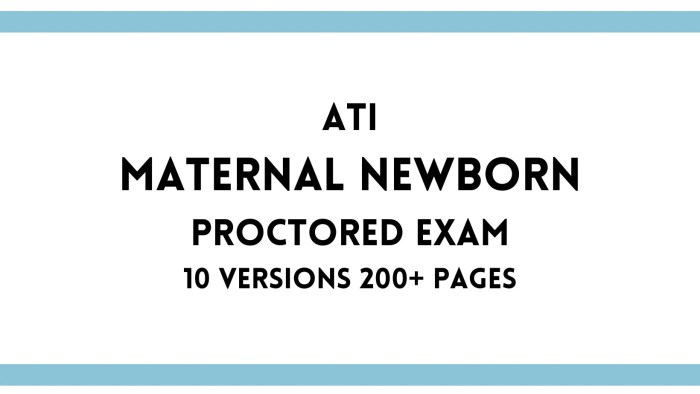Dosage calculation rn maternal newborn proctored assessment 3.1 – Dosage Calculation for Maternal and Newborn Proctored Assessment 3.1 is a crucial component of safe and effective patient care. This assessment plays a vital role in ensuring accurate medication administration, minimizing risks, and optimizing outcomes for both mothers and newborns.
Understanding the principles and processes involved in dosage calculation is essential for nurses. This includes comprehending the importance of accurate calculations, potential risks associated with errors, and the nurse’s role in ensuring medication safety.
1. Dosage Calculation for Maternal and Newborn
Importance of Accurate Dosage Calculation
Accurate dosage calculation is crucial in maternal and newborn care to ensure optimal therapeutic outcomes and prevent adverse effects. Incorrect dosages can lead to underdosing, which may result in ineffective treatment, or overdosing, which can cause toxicity and serious harm.
Common Medications and Dosage Calculations, Dosage calculation rn maternal newborn proctored assessment 3.1
Common medications used in maternal and newborn care include antibiotics, analgesics, and anticonvulsants. Dosage calculations vary depending on the specific medication, patient’s weight, age, and renal function. For example, ampicillin dosage for a newborn is calculated as 50-100 mg/kg/day divided into 3-4 equal doses.
Risks and Consequences of Incorrect Dosage Calculation
Incorrect dosage calculation can have significant consequences. Underdosing can lead to treatment failure, while overdosing can cause toxicity, organ damage, and even death.
2. Proctored Assessment 3.1
Purpose and Objectives
Proctored Assessment 3.1 is a standardized assessment tool used to evaluate nurses’ knowledge and skills in dosage calculation for maternal and newborn patients. It aims to ensure that nurses can safely and accurately calculate medication dosages.
Administration and Evaluation
Proctored Assessment 3.1 is administered by a qualified instructor in a controlled environment. Nurses are given a set of dosage calculation scenarios and have a limited time to complete them. The instructor evaluates the accuracy of the calculations and provides feedback on areas for improvement.
Interpreting and Using Results
The results of Proctored Assessment 3.1 help identify areas where nurses need additional training or support. They can also be used to track progress over time and demonstrate competency in dosage calculation.
3. Nursing Responsibilities

Role in Dosage Calculation
Nurses play a crucial role in dosage calculation for maternal and newborn patients. They are responsible for verifying physician orders, calculating dosages, preparing medications, and administering them to patients.
Responsibilities in Medication Administration
Nurses are responsible for ensuring that medications are administered safely and effectively. This includes checking patient identification, verifying medication orders, and monitoring patients for adverse reactions.
Importance of Documentation and Communication
Accurate documentation and communication are essential in dosage calculation and administration. Nurses must document all medication calculations, administrations, and any changes to the medication regimen. They must also communicate clearly with physicians, pharmacists, and other healthcare professionals involved in the patient’s care.
4. Safety Considerations
Potential Safety Concerns
Dosage calculation and administration involve potential safety concerns, such as medication errors, overdosing, and underdosing. Medication errors can occur due to miscalculations, misreadings, or confusion between similar-looking medications.
Strategies to Prevent Errors
Strategies to prevent errors include using double-checking systems, standardized medication order forms, and technology-assisted dosage calculation tools. Nurses should also be vigilant in monitoring patients for adverse reactions.
Safe Medication Handling and Storage
Proper medication handling and storage are crucial for patient safety. Medications should be stored in a secure location, away from children and pets. Nurses should follow proper procedures for preparing and administering medications, including wearing gloves and using sterile equipment.
5. Best Practices: Dosage Calculation Rn Maternal Newborn Proctored Assessment 3.1
Best Practices for Dosage Calculation
Best practices for dosage calculation include using reliable sources for drug information, double-checking calculations, and involving multiple healthcare professionals in the process. Nurses should also stay up-to-date on the latest guidelines and recommendations for medication administration.
Technology and Resources
Technology and resources can support accurate dosage calculation. Electronic medication administration systems (EMAs) can automate calculations and reduce the risk of errors. Nurses should also use drug databases and reference materials to ensure accuracy.
Ongoing Education and Training
Ongoing education and training are essential to maintain competency in dosage calculation. Nurses should participate in continuing education programs and stay informed about new medications and dosage guidelines.
Helpful Answers
What is the significance of accurate dosage calculation in maternal-newborn care?
Accurate dosage calculation is crucial to ensure the safety and effectiveness of medications administered to mothers and newborns. Incorrect calculations can lead to underdosing, which may result in inadequate treatment, or overdosing, which can cause adverse effects or even toxicity.
What are the potential risks and consequences of incorrect dosage calculation?
Incorrect dosage calculation can have serious consequences, including medication errors, adverse drug reactions, and even harm to the patient. It can lead to ineffective treatment, prolonged recovery time, or even life-threatening situations.
What is the role of nurses in dosage calculation and administration?
Nurses play a critical role in ensuring accurate dosage calculation and safe medication administration. They are responsible for verifying medication orders, calculating dosages, preparing and administering medications, and monitoring patients for any adverse effects.